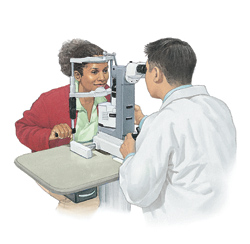Diabetic Retinopathy: Evaluating Your Eyes
Diabetic retinopathy is a condition that occurs when diabetes damages blood vessels in the rear of the eye. It can lead to vision loss. To help catch it early, have a complete dilated eye exam at least once a year. Pregnant women should have this exam more often. During the exam, the eye doctor will review your medical history, examine your eyes, and check your vision.
Your Medical History
Your eye doctor may ask about the following:
-
Your diabetes type, history, treatments (such as insulin), and how you monitor your blood sugar level

Your eye doctor examines your eyes with a slit lamp.
-
Your family's health, including whether any relative has had diabetes or diabetic retinopathy
-
Any diseases, surgeries, or other medical procedures you've had
-
Any medications, herbs, or supplements you use, including those you buy over the counter
Your Eye Exam
Your eye doctor uses an eye chart and other tools to check your vision. Then he or she examines your eyes for signs of disease. You are given eyedrops to widen (dilate) your pupils. Then you may have one or more of the following tests:
-
Tonometry to measure fluid pressure inside the eye.
-
Slit lamp exam to allow the doctor to view the structures of your eye.
-
Ultrasound to create an image of the eye using sound waves. Ultrasound may be used if blood is found in the clear gel that fills the eye (vitreous).
Fluorescein Angiography
This test may be done to check the health of the inside lining of the eye (retina). It also checks the tiny blood vessels (capillaries) that carry blood to the retina. During the test:
-
Photographs are taken of the retina.
-
A safe dye is then injected into the bloodstream through the arm or hand. The dye travels to the capillaries in the eye.
-
More photographs are taken of the retina. The dye causes the capillaries to stand out on the photographs.
You may feel brief nausea during the procedure. For a few hours after the test, your skin, eyes, and urine may appear yellow.
 Please visit us at our new location:
Please visit us at our new location: